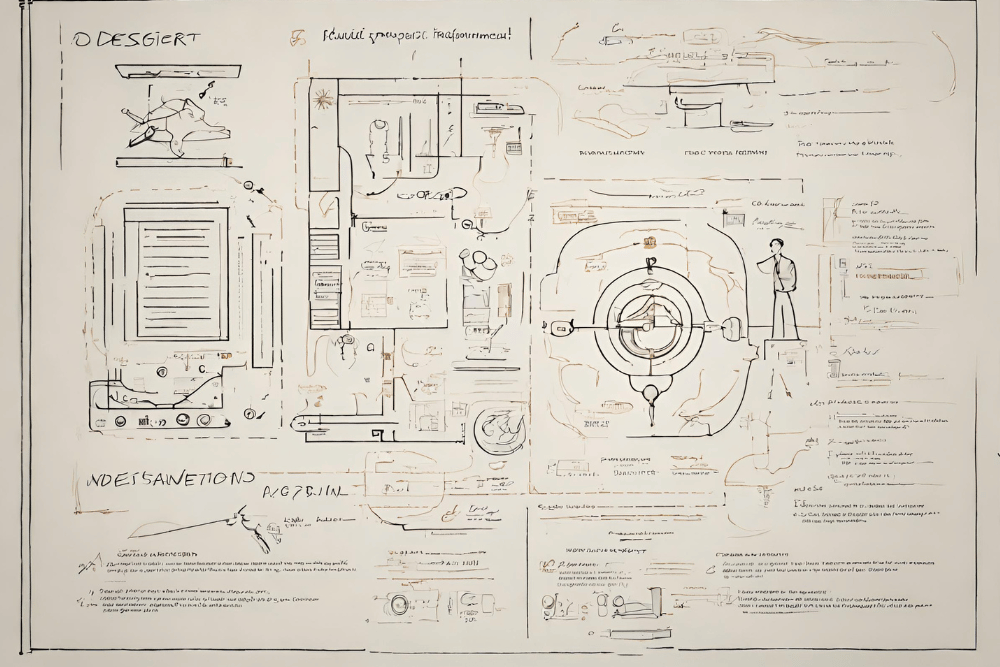In an era where innovation and creativity drive the market, product design stands at the intersection of functionality, aesthetics, and user experience. Aspiring designers are seeking educational environments that not only foster their creative talents but also equip them with the technical skills and industry knowledge necessary to excel in this dynamic field.
Product design colleges play a pivotal role in shaping the visionaries who will create the next wave of groundbreaking products, from everyday household items to cutting-edge technology.
Choosing The Right Product Design Colleges For You

Deciding on the perfect product design colleges is a crucial step towards shaping your career in this field. With several options available in America, you need to consider various factors before making a choice. Let’s look at some essential considerations to help you select the right product design colleges for your educational journey.
Factors To Consider
- Location: The geographical location of product design colleges can impact your overall college experience and future job opportunities within the design industry. Consider whether you prefer an urban or rural setting and how it aligns with your lifestyle and career goals.
- Curriculum: Look for colleges that offer a comprehensive product design curriculum, incorporating both theoretical knowledge and hands-on experience. A holistic curriculum will equip you with the necessary skills and knowledge to succeed in the field.
- Faculty Expertise: The expertise and experience of the faculty members play a crucial role in your education. Research the academic background and professional experience of the product design colleges to ensure that you will receive high-quality instruction and mentorship.
- Industry Connections: College partnerships with design firms, companies, and industry professionals can provide valuable networking opportunities, internships, and career prospects. Consider the college’s connections within the product design industry.
- Facilities and Resources: Assess the availability of state-of-the-art design studios, workshops, and resources essential for hands-on learning and projects. Adequate facilities can enhance your learning experience and skill development.
Additional Considerations
- Alumni Success: Explore the achievements and success stories of the product design colleges alumni in the product design field. A strong track record of alumni success indicates the college’s ability to prepare students for a successful career.
- Internship Opportunities: product design colleges that offer robust internship programs and industry placements can provide valuable practical experience and networking opportunities essential for launching your career.
- Student Support Services: Consider the availability of academic advising, career services, and student support programs. These services can contribute to your overall academic and personal well-being during your college experience.
Top 20 Industrial And Product Design Colleges
Choosing the right product design colleges in America involves thoughtful consideration of various factors to ensure that it aligns with your aspirations and sets the foundation for your professional growth in the field.
Choosing the right college is a crucial step for aspiring industrial and product designers. Here are twenty of the best industrial and product design colleges in America, known for their exceptional programs, faculty, and industry connections:
- Rhode Island School of Design (RISD)
- Renowned for its rigorous curriculum and emphasis on hands-on learning, RISD offers a comprehensive Industrial Design program.
- ArtCenter College of Design
- Located in Pasadena, California, ArtCenter is famous for its strong focus on both industrial and product design, blending creativity with technical skills.
- Pratt Institute
- Situated in New York City, Pratt provides a dynamic environment for design students, with a strong emphasis on sustainable and innovative design practices.
- Savannah College of Art and Design (SCAD)
- SCAD offers a robust Industrial Design program with state-of-the-art facilities and extensive industry connections.
- Carnegie Mellon University
- Known for its interdisciplinary approach, Carnegie Mellon’s School of Design integrates technology and design thinking.
- Stanford University
- The Hasso Plattner Institute of Design (d.school) at Stanford offers a unique approach to design education, emphasizing human-centered design and innovation.
- California College of the Arts (CCA)
- CCA’s Industrial Design program in San Francisco focuses on creating sustainable, socially responsible designs.
- University of Cincinnati
- The College of Design, Architecture, Art, and Planning (DAAP) at the University of Cincinnati is well-regarded for its co-op programs and industry partnerships.
- Rochester Institute of Technology (RIT)
- RIT offers a comprehensive Industrial Design program with a strong focus on user experience and practical application.
- Cranbrook Academy of Art
- Known for its graduate programs, Cranbrook offers a highly individualized approach to industrial design education.
- University of Illinois at Urbana-Champaign
- The Industrial Design program here is known for its strong technical foundation and emphasis on innovation and research.
- Parsons School of Design
- Part of The New School in New York City, Parsons offers a cutting-edge Product Design program that encourages experimentation and interdisciplinary collaboration.
- Syracuse University
- The College of Visual and Performing Arts at Syracuse provides a robust Industrial and Interaction Design program with a strong emphasis on research and user-centered design.
- School of the Art Institute of Chicago (SAIC)
- SAIC offers a dynamic Product Design program with a focus on conceptual thinking and real-world application.
- Auburn University
- Auburn’s Industrial Design program is known for its strong studio culture and comprehensive curriculum.
- Virginia Tech
- The Industrial Design program at Virginia Tech emphasizes design thinking, creativity, and sustainability.
- Georgia Institute of Technology
- Georgia Tech offers a forward-thinking Industrial Design program with strong ties to the engineering and technology sectors.
- University of Michigan
- The Stamps School of Art & Design at the University of Michigan offers a multidisciplinary approach to product design education.
- Arizona State University
- ASU’s Herberger Institute for Design and the Arts provides a comprehensive Industrial Design program with a focus on innovation and sustainability.
- Brigham Young University (BYU)
- BYU’s Industrial Design program combines a strong technical foundation with a focus on creativity and practical skills.
These product design colleges offer diverse approaches to industrial and product design education, providing students with the knowledge, skills, and experiences needed to excel in the field.
Also read: Colleges with Physical Education Teaching and Coaching Degrees in the US
Product Designs, Prototypes, Business Partners
Top product design colleges offer comprehensive programs in product design, prototyping, and business partnerships. Unlock opportunities to collaborate with industry experts, gain hands-on experience, and build a diverse skill set. Choose from institutions renowned for fostering innovation and creativity in the field of product design.
Plain Paragraph:
Product design colleges unveils a world of creativity, innovation, and collaboration. Let’s dive into how these institutions excel in producing exceptional product designs, crafting prototypes, and fostering valuable business partnerships.
Bullet Points:
- Product Designs: Students are encouraged to unleash their creativity through hands-on projects and design challenges. Cutting-edge technologies and design tools are utilized to bring ideas to life.Faculty guidance and industry insights help students refine their design skills and think outside the box.
- Prototypes: Prototyping labs equipped with state-of-the-art machinery allow students to prototype their concepts in a real-world setting. Iterative prototyping processes ensure the creation of functional and visually appealing prototypes. Collaborative projects enable students to experiment with materials, processes, and functionality.
- Business Partners: Partnerships with industry leaders provide students with real-world project opportunities and networking connections.
- Entrepreneurship programs equip students with the skills to turn their designs into viable products and businesses.
- Mentorship from successful design entrepreneurs guides students in understanding market trends and consumer needs.
Product Design Expert Education Requirements

Product design is a field that combines creativity, problem-solving, and innovation to develop new and improved products. If you have a passion for design and an eye for detail, a career in product design may be the perfect fit for you.
To excel in this field, it’s crucial to have the right education and training. In this blog post, we will explore the education requirements for becoming a product design expert.
Undergraduate Degree In Design Or Related Field
- Pursuing a bachelor’s degree in product design, industrial design, or a related field is the first step towards becoming a product design expert.
- A 4-year undergraduate program provides a strong foundation in design principles, technical skills, and creativity.
- Students gain knowledge in areas such as sketching, prototyping, computer-aided design (CAD), materials, and manufacturing processes.
Specialized Courses And Workshops
- To enhance their skills and stay updated with the latest industry trends, product design experts often participate in specialized courses and workshops.
- These programs focus on specific aspects of product design, such as user experience (UX) design, product aesthetics, sustainable design, and design thinking.
- Workshops offer hands-on experience and allow professionals to network with other experts in the field.
Master’s Degree In Product Design
- While not always necessary, a master’s degree in product design can provide a significant advantage in the job market and open up opportunities for advanced roles.
- Master’s programs delve deeper into design research, product development, and strategic thinking.
- Students have the chance to work on real-world projects and collaborate with industry professionals.
Strong Portfolio
- Building a strong portfolio is essential for product design experts to showcase their skills, creativity, and versatility.
- The portfolio should include a variety of projects that highlight different design processes, problem-solving abilities, and attention to detail.
- Employers often review portfolios to assess a candidate’s suitability for a specific role.
Internships And On-the-job Training
- Gaining practical experience through internships or on-the-job training is highly beneficial for aspiring product design experts.
- Internships provide hands-on experience in industry settings, allowing individuals to apply their skills and knowledge to real projects.
- Collaborating with experienced professionals helps develop a deeper understanding of the product design process and industry best practices.
Continuous Learning And Skill Development
- Product design is a rapidly evolving field, so it’s essential for experts to stay updated with the latest tools, technologies, and design methodologies.
- Continuing education programs, online courses, and industry conferences offer opportunities for professionals to enhance their skills and expand their knowledge.
Networking And Collaboration
- Building a strong professional network is vital for product design experts.
- Attending design events, conferences, and workshops allows individuals to connect with industry leaders, potential mentors, and like-minded professionals.
- Collaboration with other designers and experts from different backgrounds can lead to new ideas, insights, and opportunities.
Problem-solving And Critical Thinking Skills
- Product design experts should possess strong problem-solving and critical thinking skills.
- The ability to identify user needs, analyze complex data, and propose innovative solutions is crucial for success in the field.
- Developing these skills can be achieved through practice, teamwork, and engaging in design challenges.
Communication And Presentation Skills
- Effective communication and presentation skills are essential for product design experts to convey their ideas and concepts to colleagues, clients, and stakeholders.
- Experts should be able to articulate design choices, justify their decisions, and communicate the user experience effectively.
Passion, Creativity, And Curiosity
- Beyond formal education and technical skills, product design experts should have a genuine passion for design.
- Creativity and a curiosity-driven mindset are key attributes that allow professionals to think outside the box, explore new possibilities, and push boundaries in their designs.
Becoming a product design expert requires a combination of formal education, practical experience, continuous learning, and a genuine passion for design. By obtaining the right education and developing the necessary skills, aspiring product design experts can pursue rewarding careers in this dynamic field.
Career Opportunities In Product Design
Product design is an exciting field that combines art, technology, and user experience to create innovative and functional products. If you have a passion for creativity and problem-solving, a career in product design might be the perfect fit. In this section, we will explore the career opportunities available in the field of product design.
In-house Design Teams:
- Many companies have their own in-house design teams, which are responsible for creating and developing new products. These teams work closely with engineers, marketers, and other stakeholders to bring ideas to life. Joining an in-house design team can offer stability, as you would be working within a company on a wide range of projects.
Design Consultancies:
- Design consultancies are external agencies that companies hire to help them with product design. These agencies often work with a variety of clients and projects, providing a unique and diverse working experience. Working for a design consultancy allows you to collaborate with different industries and gain exposure to various design challenges.
Freelancing:
- Freelancing is a popular choice for product designers who prefer flexibility and independence. As a freelancer, you can choose your own clients and projects, allowing you to work on what interests you the most. Building a strong portfolio and networking are crucial for success as a freelancer in product design.
Startups:
- Joining a startup can offer a dynamic and fast-paced environment for product designers. Startups often have smaller teams, which means you’ll have more responsibility and the opportunity to work on multiple aspects of product design. Working at a startup can also provide the chance to shape the direction and vision of a new product.
Ux/ui Design:
- User experience (UX) and user interface (UI) design are integral parts of product design. Focusing on UX/UI design opens up career opportunities in designing intuitive and user-friendly interfaces for digital products, websites, and apps. With the growing importance of technology, expertise in UX/UI design can lead to exciting opportunities in various industries.
Research And Development:
- Some product designers choose to work in research and development (R&D) departments, where they explore and develop new technologies, materials, and processes. R&D roles allow designers to push boundaries and innovate in their field, contributing to advancements in product design and development.
Education And Academia:
- If you have a passion for teaching and sharing your knowledge, a career in education or academia may be a good fit. Many colleges and universities offer product design programs, and qualified professionals are needed to educate the next generation of designers.
Entrepreneurship:
- For those with an entrepreneurial spirit, starting your own product design company can be a rewarding career path. It allows you to take complete control over your projects, work with clients of your choosing, and build a business from the ground up. Entrepreneurship in product design requires a combination of design skills, business acumen, and a strong network.
There are various career opportunities available for product designers, ranging from working in-house or at design consultancies, to freelancing or starting your own venture. Whether you prefer a stable job within a company or the freedom of freelancing, the field of product design offers a world of possibilities.
Pursuing your passion for creativity and problem-solving can lead you to a fulfilling and exciting career in product design.
Conclusion
As you consider the best product design colleges, remember to prioritize hands-on experiences. Selecting product design colleges that offers industry connections can greatly benefit your future career. Keep in mind factors like faculty expertise and innovative curriculum while making your decision.
Investing in a reputable program can lead to exciting opportunities in the design field.
